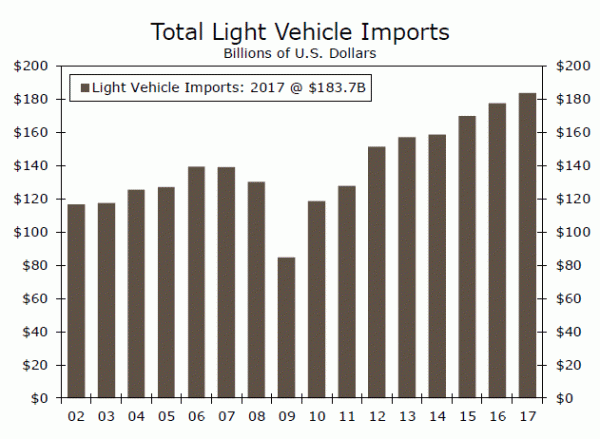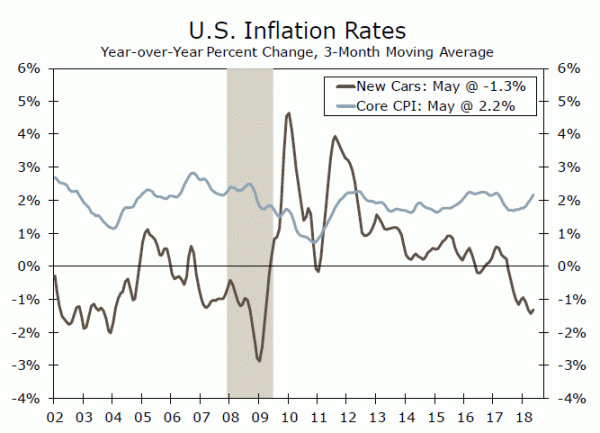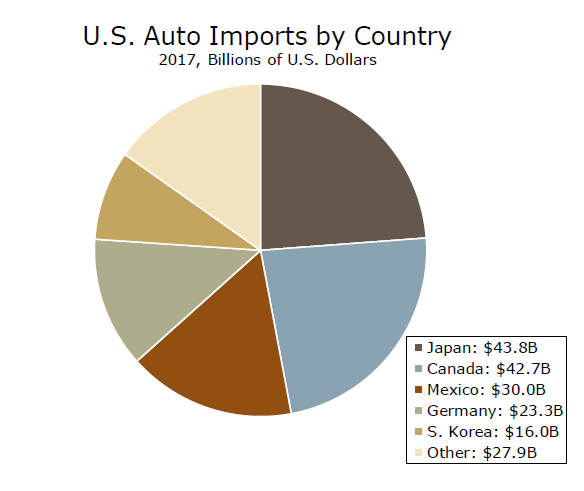The effects of auto tariffs on American consumers and U.S. inflation should be limited. Canada and Mexico are the trading partners with the most to lose from American tariffs on autos.
Effect on U.S. Economy Should Be Limited
At the conclusion of the recently concluded G-7 meeting in Canada, President Trump raised the possibility of levying tariffs on imports of automobiles. How would tariffs on auto imports, perhaps as high as 25 percent, affect American consumers? Which foreign economies would be most adversely affected by tariffs on U.S. auto imports?
As shown in the top chart, the value of auto imports has risen significantly since the depths of the Great Recession and totaled nearly $185 billion last year. Although prices of imported vehicles probably would not rise by the full amount of the tariff, consumers likely would see a significant rise in prices of new imported cars if tariffs are enacted. Moreover, prices of domesticallyproduced autos probably would rise as well. Not only would demand increase for domestically-produced autos as prices of imports rose, but American carmakers could take the opportunity to increase their profit margins.
Although individual consumers could face significantly higher prices for cars, the effects on the macro U.S. economy likely would be limited. Over the past three years, there have been roughly 17 million cars and light trucks sold per year. But there currently are more than 260 million cars in the United States. Not every household buys a car every year, so consumers will not be affected by higher auto prices until they decide to buy a new car. The value of new car sales totaled an impressive $282 billion last year, but that amount accounted for only 2 percent of overall personal consumption expenditures (PCE) in 2017. Similarly, the effect on U.S. inflation from higher auto prices should be rather muted. New autos represent only 3.7 percent of the consumer price index (CPI), and the correlation of year-over-year changes in new car prices with core CPI inflation is rather low (middle chart).
Canada and Mexico Have the Most to Lose
So which American trading partners would have the most to lose from the imposition of tariffs on autos? As shown in the bottom chart, Japan and Canada each sent more than $40 billion worth of autos to the United States last year. Mexico ($30 billion), Germany ($23 billion) and South Korea ($16 billion) also have significant amounts of absolute exposure to the U.S. auto market. But Japan has the third largest economy in the world, and auto exports to the United States are equivalent to only 1 percent of Japanese GDP. A similar proportion holds for the South Korean economy, and exports of automobiles are equivalent to only 0.6 percent of German GDP. Not only do Mexico and Canada each have significant amounts of auto exports to the United States, but their economies are relatively smaller than Japan and Germany. Consequently, auto exports are equivalent to nearly 3 percent of GDP in both Mexico and Canada. In other words, America’s NAFTA partners would be most adversely affected by U.S. tariffs on autos.



